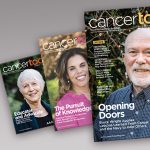-
2023: The Year in Cancer News
The Cancer Today editors share the most impactful reporting and essays of 2023.
by Cancer Today staff
-
Emerging Treatments for Brain Metastases in Breast Cancer
SABCS panel describes advances and pivotal questions in managing patients whose breast cancer has metastasized to their brain.
by Marci A. Landsmann
-
Cancer Today Editors’ Picks: 2023
The editors of Cancer Today share the stories that most resonated with readers in 2023.
-
December 15: The Week in Cancer News
Study finds breast cancer survivors can opt for less frequent screening, and people with physical disabilities often encounter discrimination in cancer care.
by Thomas Celona
-
Patient Advocates as Research Partners
Speakers at SABCS discuss how people who have lived with breast cancer can be valuable partners in research.
by Eric Fitzsimmons
-
Understanding Side Effects and the Patient Experience
Researchers focus on assessing quality of life and toxicity risks in people with breast cancer.
by Thomas Celona
-
Addressing Social Determinants of Health
Speakers at SABCS discuss measuring and meeting social factors that affect the health and outcomes of breast cancer patients.
by Kevin McLaughlin
-
December 8: The Week in Cancer News
Less radiation explored in multiple studies at San Antonio Breast Cancer Symposium, and National Cancer Institute writes next precision medicine chapter.
by Marci A. Landsmann
-
Exercise Benefits in Metastatic Breast Cancer
Study finds supervised physical activity can help improve quality of life and reduce fatigue among people with metastatic breast cancer.
by Thomas Celona
-
Finding Answers in Prostate Cancer
PSMA PET imaging is helping clinicians more accurately stage prostate cancer and provide precision treatment.
by Sandra Gordon
Cancer Talk
Many People Don’t Get Colonoscopy After Receiving Abnormal Blood Tests
About half of people who receive abnormal results from colorectal cancer screening tests don’t follow up with a colonoscopy.
by Laura Gesualdi Gilmore
Can Steroids Impair Immunotherapy for Cancer?A new study suggests steroids could blunt the effects of some immunotherapies, but researchers say they remain necessary for some patients.
by Kyle Bagenstose
Treatment Combination Improves Survival in Platinum-resistant Ovarian CancerPreliminary results found that combining relacorilant with nab-paclitaxel improved outcomes for women with advanced ovarian cancer.
by Sandra Gordon
CAR T-cell Therapy Shows Response in Rare Brain CancerPotential new approach to treating diffuse intrinsic pontine glioma uses engineered immune cells infused directly to the brain.
by Taneia Surles














